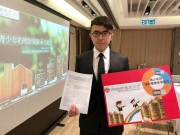Financial education helps reduce intergenerational poverty risk of grass-roots students, LU scholar research finds

Adolescents from lower-income families lack confidence in making high-risk investment decisions for high returns. They are unable to take financial management risks, according to recent research by a LU scholar. These young people at grassroots level hold back from making investment choices and the material returns, missing opportunities for upward mobility and making a fortune.
The research was conducted in September last year. A total of 330 students in six local secondary schools, aged between 13 and 17 and from families of inferior financial position, were interviewed at random in surveys and financial games. Around 70 per cent of respondents were rated with low capacity to bear financial management risks, while only 30 per cent were willing to take higher risks for better returns. The social economy and mental and cognitive factors can help to increase their risk-taking capacity, the research revealed.
Led by Dr Alex Zhu Yuefeng, Research Assistant Professor of School of Graduate Studies, the research was published in an international academic journal Children and Youth Services Review this May. According to Dr Zhu, grassroots students put emphasis on the present rather than the future, and lack confidence in future planning in general. Adolescence is, however, the only time for them to make high-risk investments. He suggests that the government could offer practical courses relating to financial management risks in the secondary three and four curriculum, providing students with actual practice in understanding how the social economy operates and fostering investor confidence at a young age, so as to help reduce the risk of intergenerational poverty.
Dr Alex Zhu Yuefeng


